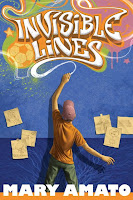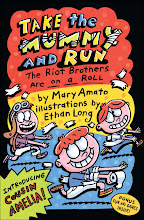
When I am stuck in the snowdrift of writer’s block on a book that I am either writing or revising, I will reach for some non-fiction to read that seems unrelated. I think of it as a temporary distraction, something to take my mind off the frostbite that has gripped my imagination. But—when the muse is smiling on me—whatever I’m reading will trigger an avalanche in my brain that completely changes the landscape of my own work.
This happened with my forthcoming book Invisible Lines (Egmont USA, October 2009) in a big way. I was giving up on my novel, and I happened to read Mycelium Running: How Mushrooms Can Help Save the World by Paul Stamets, and the avalanche began.
Thankfully, inspiration comes at unexpected times, from unexpected sources.
This happened with my forthcoming book Invisible Lines (Egmont USA, October 2009) in a big way. I was giving up on my novel, and I happened to read Mycelium Running: How Mushrooms Can Help Save the World by Paul Stamets, and the avalanche began.
Thankfully, inspiration comes at unexpected times, from unexpected sources.



